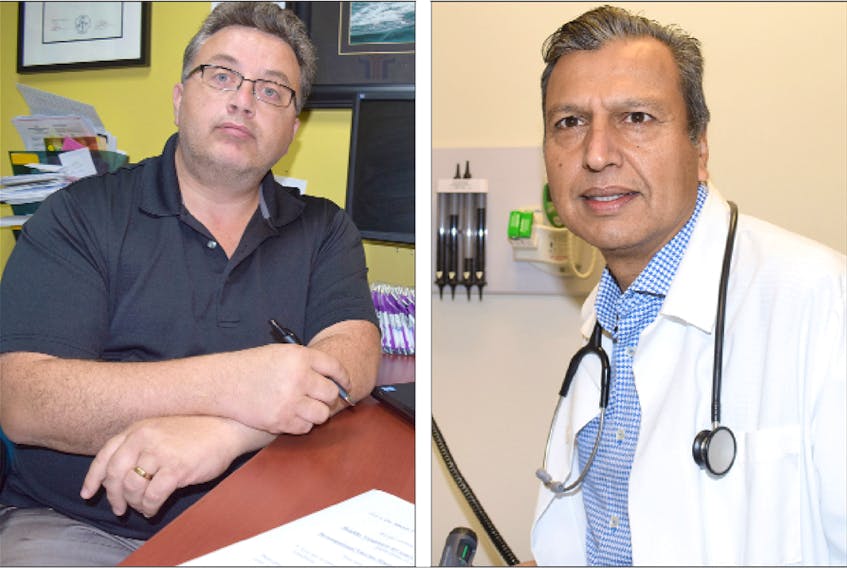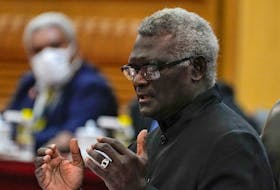TRURO, N.S – Leona Harvey felt ill and didn’t want to to wait out the weekend to secure an appointment with her family doctor.
So she tried her luck with a medical clinic in Truro.
Turned out, she couldn’t get any farther ahead. Harvey was told there were no available appointments until the following week.
“But what’s a walk-in clinic? Isn’t that something you’re just supposed to walk in?” she asked, during a call to the Truro News.
At one time, yes.
But both Dr. Murdo Ferguson, owner of the Truro Walk-In Clinic on Robie Street and Dr. Manoj Vohra, owner of the Care Now Walk In Clinic on Pictou Road in Bible Hill say times have changed. It’s due in part to an acute shortage of family doctors across Nova Scotia that has created an increase of patients turning to the clinics for care. And fewer doctors to serve them.
There has also been a change in perspective. The new reality is that a system with long lineups of patients on a first-come, first-served basis, is simply not efficient.
“I think walk-in clinics are providing a service to people who don’t have anywhere else to go for their care,” Ferguson said.
His clinic opened in 2001. While it was operated purely as a walk-in clinic for many years, that service model was deemed to be outdated.
“Initially we simply opened the doors a half-hour early and patients were served on a first-come basis,” Ferguson said. “But we realized that was hard on the patients who were often unwell or had other things to do, like work or look after their kids. It’s not good to have people waiting outside your door for one or two hours.”
To avoid those lineups, the clinic hired staff to answer the telephone during daytime hours to set up appointments during the clinic’s operating hours, evenings and weekends.
Harvey visited the clinic at about 6:30 p.m. on a Thursday evening. She couldn’t understand why she was unable to access a doctor, given there were only two other people in the waiting room.
But Ferguson said although the waiting room was nearly empty, the evening’s schedule was entirely full because of previously booked appointments. And, that was precisely how the appointment system is designed to work.
“What we try and do is, book the evening sequentially so we don’t have 40 or 50 people sitting in the waiting room at one time,” he said. “We try to book patients in a way that patients can come and go, be seen quickly and get on with their day and get on with their life.”
Due to the shortage of physicians, many of those who work in the walk-in clinics also have family practices or work at the hospital. So the time they spend at the clinics is in addition to an already full workload.
Given that “finite resource” Ferguson said, it is simply no longer “reasonable” to expect that someone could walk in and expect to be seen right away.
“Just like any other service, the emergency department, a lawyer’s office, an accountant’s office or any other professional service office, appointments will get booked up,” he said.
Vohra agreed.
As with the Truro clinic, his facility is also still officially labeled as a “walk-in,” although patients there have to book appointments online or by telephone.
“My experience was people would line up for two hours to get an appointment on a first-come, first-served basis and there was no need to,” he said.
“I think the days are gone that you have to stand outside hoping for care. It just didn’t make sense.”
Doctor shortage eroding viability of walk-in clinics
BIBLE HILL, N.S. – A growing shortage of family doctors is placing increased pressure on the ability of two “walk-in” clinics to remain in operation, their owners say.
“The fact that close to one in 10 Nova Scotians don’t even have a family doctor is just astounding,” said Dr. Murdo Ferguson, owner of the Truro Walk-In Clinic on Robie Street.
“Based on what we see coming into the walk-in clinic and the hospital, there are more and more people in the distressing situation of not having a family doctor. And that’s distressing to the doctors, as well,” he said. “It puts an added burden on primary care physicians and specialists, nurse practitioners and health-care workers in general.”
His clinic opened in 2001 and is one of the longest surviving clinics in the province, Ferguson said. But as more doctors either retire or leave to practise elsewhere, it is becoming increasingly difficult to offer clinical services.
Officially, there are approximately 60,000 Nova Scotians on the waiting list for a family doctor. Ferguson, however, believes the actual figure is closer to 100,000, because of the number of people who haven’t added their names to the list or those who have simply given up trying.
For younger, healthier individuals, not having a family physician, while upsetting, is often more of an inconvenience.
But for the elderly, or those with serious conditions such as cancer, heart disease, unstable diabetes or mental health issues, the situation become more dire, because clinics are not designed to offer continuing care.
“So, the truth of the matter is, Nova Scotia has a serious lack of manpower both in mental health and in primary care and in some other areas, too,” Ferguson said. “And Nova Scotians certainly deserve better.”
Over the past few months, Dr. Manoj Vohra, owner of the Care Now Walk In Clinic on Pictou Road in Bible Hill, said it has become increasingly difficult to maintain proper staffing at his clinic because of the ongoing doctor shortage.
“Now it’s become running another family practice out of a walk-in clinic. So that becomes an issue and continuity of care becomes an issue,” he said. “So, there’s a lot of challenges.”
Vohra said three doctors who once assisted at his clinic no longer do so, which creates a real concern if that trend continues.
“There is a real challenge to get enough resources to clinics,” he said. “In terms of mine, we’re just trying to hold it together, honestly, because we’ve been shut down over the last couple of months because we just don’t have enough resources.”
And Vohra said he is not confident that recruits the province is successful in obtaining will help the situation.
“I would suggest a lot of the new physicians who are coming in, if they are on a contract, are unable to work outside that contract. And that makes it difficult because we sort of have dwindling resources and an increased need with patients without physicians.”








